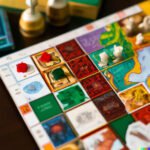Strategy board games for 9-10 year olds offer a fantastic opportunity for children to enhance their cognitive skills, critical thinking, and problem-solving abilities in a fun and engaging way. These games not only provide entertainment but also stimulate young minds by encouraging strategic thinking and decision-making. In this article, we will explore the benefits of strategy board games specifically tailored for children aged 9-10, highlighting why they are such valuable tools for development at this age.
As children continue to grow and develop, strategy board games become an essential tool in honing their mental faculties. Games like chess, Settlers of Catan Junior, or Ticket to Ride: First Journey offer opportunities for kids to think critically, plan ahead, and adapt their strategies based on changing circumstances. By engaging with these types of games, children can improve their problem-solving skills while having fun and enjoying quality time with friends and family.
Moreover, strategy board games help children develop important social skills through interaction with peers or family members. These games promote communication, cooperation, and teamwork as players work together to achieve common goals or compete against each other in a friendly setting. By playing strategy board games regularly, children can learn how to communicate effectively, negotiate with others, and collaborate towards shared objectives – all valuable skills that will benefit them well beyond game time.
Top 5 Strategy Board Games for 9-10 Year Olds
Strategic thinking is a crucial skill that can be developed in children at a young age through playing strategy board games. For 9-10 year olds, these games not only provide entertainment but also offer valuable learning opportunities. Whether it’s honing problem-solving abilities, enhancing critical thinking skills, or fostering social interaction and teamwork, strategy board games have numerous benefits for children in this age group.
To help parents and caregivers choose the right strategy board game for their 9-10 year olds, here are the top 5 recommendations:
- Ticket to Ride: In this game, players collect train cards to claim railway routes across North America. With simple rules and engaging gameplay, it’s perfect for beginners.
- Settlers of Catan Junior: A modified version of the popular Settlers of Catan game, this child-friendly edition introduces kids to resource management and negotiation skills.
- Blokus: Players strategically place pieces on the board to block opponents while aiming to cover as much territory as possible. It promotes spatial awareness and planning.
- Forbidden Island: A cooperative game where players work together to rescue treasures from a sinking island. It encourages teamwork and decision-making under pressure.
- Splendor: This game challenges players to build an empire using gem tokens by making strategic decisions and planning ahead for efficient resource management.
Each of these strategy board games offers a unique experience that can help enhance various cognitive skills in 9-10 year olds while also providing hours of entertainment. By introducing children to these games, parents can support their development in a fun and engaging way.
Why Strategy Board Games Are Important for Kids’ Development
Strategy board games for 9-10 year olds are not just a source of entertainment; they also play a vital role in the development of various cognitive skills. These games require players to think critically, plan ahead, and make strategic decisions. By engaging in such gameplay, children can enhance their problem-solving abilities as they analyze different situations and explore various solutions. The necessity to anticipate opponents’ moves and adapt strategies accordingly encourages logical thinking and enhances their cognitive flexibility.
Moreover, strategy board games help children develop patience and perseverance. As they face challenges within the game, kids learn to overcome obstacles through trial and error, fostering resilience and determination. This aspect of gameplay is crucial for building a growth mindset, where mistakes are viewed as opportunities for learning and improvement. By exercising these skills in a fun and engaging setting, children are better equipped to tackle real-life problems with confidence and creativity.
Critical thinking is another key skill that thrives through playing strategy board games at a young age. Children are required to evaluate information, assess consequences of different actions, and make informed decisions based on observations and predictions. This process not only sharpens their analytical thinking but also hones their ability to think strategically in various scenarios. Ultimately, by honing these cognitive skills through gameplay, children can strengthen their overall mental acuity and prepare themselves for academic challenges and future successes.
How to Choose the Right Strategy Game for Your Child
When it comes to selecting the right strategy board game for your 9-10 year old, there are several key factors to consider. One of the most important aspects to look at is the complexity of the game.
You’ll want to choose a game that strikes a balance between being challenging enough to engage your child’s mind and not too difficult that it becomes frustrating. Games that offer different levels of difficulty or have clear instructions can be ideal for this age group.
Another factor to take into account is the theme of the game. Children in this age range are often drawn to games with themes that spark their imagination and interest. Whether it’s exploring outer space, solving mysteries, or embarking on an adventure, finding a game with a theme that resonates with your child can enhance their overall gaming experience.
Player interaction is also a crucial element when choosing a strategy board game for 9-10 year olds. Look for games that encourage social interaction, cooperation, and healthy competition among players. Games that involve teamwork or allow for strategic alliances can help children develop their communication skills and foster a sense of camaraderie. Here are some recommendations based on these factors:
- Settlers of Catan: A classic strategy board game that combines resource management and negotiation skills.
- Ticket to Ride: Perfect for young travelers, this game challenges players to build railway routes across different cities.
- Carcassonne: This tile-placement game encourages strategic thinking and planning as players construct medieval landscapes.
- Castle Panic: A cooperative tower defense game where players work together to defend their castle from monster attacks.
- Blokus: A spatial strategy game that promotes critical thinking and spatial awareness as players try to place their pieces strategically on the board.
By considering these factors such as complexity, theme, and player interaction when selecting a strategy board game for your 9-10 year old, you can help them develop important skills while having fun at the same time.
Tips for Teaching Strategy Games to Kids
When it comes to introducing strategy board games for 9-10 year olds to children, it is important to take a thoughtful approach that encourages learning and enjoyment. One effective strategy is to start with games that have simple rules and are easy to grasp, gradually increasing the complexity as your child becomes more comfortable with the gameplay.
By beginning with straightforward games, kids can build their confidence and develop a strong foundation for understanding more intricate strategies in the future.
Another valuable tip for teaching strategy board games to children is to actively involve them in the learning process. Rather than simply explaining the rules, consider playing a practice round or two together before diving into a full game.
This hands-on approach can help kids better understand the mechanics of the game and feel more engaged in the learning experience. Encouraging open communication during gameplay can also foster a collaborative environment where children can ask questions, share ideas, and learn from one another.
Additionally, incorporating elements of fun and creativity into the teaching process can make learning strategy board games more enjoyable for 9-10 year olds. Consider using colorful game pieces, creating themed play environments, or even developing fun mnemonic devices to help children remember key strategies or rules. By making the learning experience interactive and entertaining, you can instill a positive attitude towards strategy games in kids and cultivate a lifelong love for strategic thinking and problem-solving.
| Tip | Description |
|---|---|
| Start Simple | Begin with games that have simple rules to build confidence |
| Hands-On Learning | Play practice rounds together to enhance understanding |
| Fun and Creativity | Incorporate elements of fun and creativity for an engaging experience |
Family Game Night Ideas
Family game nights are a fantastic way to bring the family together, have fun, and create lasting memories. By incorporating strategy board games into these gatherings, not only can you enjoy quality time together, but you can also stimulate your child’s cognitive development. Strategy board games for 9-10 year olds are particularly beneficial as they can help improve critical thinking skills, problem-solving abilities, and decision-making processes in a fun and engaging way.
Game Rotation
To keep family game nights exciting and enjoyable for everyone, consider rotating different strategy board games each week. This will not only introduce your children to a variety of games but will also provide them with new challenges and experiences. By exposing them to different types of strategy games, you can help broaden their skills and interests while keeping the evening fresh and interesting.
Team-Based Games
Incorporating team-based strategy board games can promote cooperation and communication among family members. Games that require players to work together towards a common goal can encourage teamwork skills in children. Additionally, team-based games can help reinforce the importance of collaboration, coordination, and strategizing as a group – valuable skills that extend beyond the game board and into everyday life.
Parent vs. Child Challenges
Another fun way to include strategy board games in family game nights is by having parent vs. child challenges. This friendly competition can be an excellent opportunity for children to learn from their parents’ strategies while also putting their own skills to the test.
It creates a playful environment where kids can feel empowered by competing against adults while parents can bond with their children over shared activities. The thrill of facing off against each other adds an extra layer of excitement to the game night experience.
Benefits of Social Interaction in Strategy Games
When it comes to children ages 9-10, strategy board games play a crucial role in not just entertaining them, but also enhancing their social skills. Through playing these games, kids have the opportunity to interact with others, communicate effectively, and work as a team to achieve a common goal.
One of the key benefits of social interaction in strategy board games is the improvement in communication skills. As children engage in discussions, negotiations, and decision-making during gameplay, they learn how to express their thoughts clearly, listen actively to others’ ideas, and convey their strategies effectively.
Moreover, strategy board games encourage teamwork among 9-10 year olds. By collaborating with their peers to devise winning strategies and overcome challenges within the game, kids learn how to coordinate with others towards a shared objective. This fosters essential teamwork skills such as cooperation, problem-solving together, and respecting each other’s opinions and contributions. Additionally, social interaction in these games helps children develop empathy as they understand different perspectives and work towards mutual success rather than individual achievement.
In a study conducted by Child Development journal in 2014, researchers found that children who engaged in strategic board games showed significant improvements in their social skills compared to those who did not participate in such activities. The cooperative nature of these games promotes positive social behaviors like sharing resources, taking turns, and supporting each other throughout the gameplay.
Overall, encouraging social interaction through strategy board games for 9-10 year olds not only enhances their communication and teamwork abilities but also nurtures valuable life skills that are essential for their personal growth and development.
| Social Skills | Benefits |
|---|---|
| Improved Communication | Enhanced ability to express thoughts clearly and listen actively |
| Teamwork | Develops cooperation, problem-solving together and respect for others’ opinions |
| Empathy | Promotes understanding of different perspectives and working towards shared goals |
Fun DIY Board Game Ideas for Kids
Are you looking for a fun and creative way to engage your 9-10-year-old in strategic thinking and problem-solving? Why not try creating your own DIY board game together? Not only is it a fantastic bonding activity for the family, but it also challenges children to think creatively and strategically while having a blast. In this section, we will explore some creative and educational ideas for making your own strategy board games at home.
Materials Needed
Before diving into the world of DIY board game creation, gather up some essential materials such as cardstock, markers, dice, game pieces (you can get creative with household items), a cutting tool, and any other decorative items you may want to use. Having a clear plan of the game’s rules and objectives will also be crucial in guiding the design process.
Brainstorm Game Ideas
Sit down with your child and brainstorm ideas for the theme of your board game. Perhaps they have a favorite book or movie that can serve as inspiration, or maybe they want to create something entirely unique. Encourage them to think about what kind of strategy elements they would like to incorporate into the game – whether it’s resource management, tactical movement, or critical decision-making.
Design and Test Your Game
Once you’ve settled on a concept for your DIY board game, it’s time to start designing. Let your child take the lead in creating the layout of the board, designing cards or pieces, and establishing the rules of play. As you build the game together, don’t forget to playtest it regularly to ensure that it’s balanced and engaging.
This hands-on experience will not only foster creativity but also teach important lessons in problem-solving and iteration. With a little creativity and teamwork, you’ll have a unique strategy board game that is sure to provide hours of fun for your 9-10-year-old.
Conclusion
In conclusion, strategy board games for 9-10 year olds play a crucial role in not only providing entertainment but also fostering important skills and development. These games are more than just fun pastimes; they serve as valuable tools for enhancing cognitive abilities, problem-solving skills, and critical thinking in children. By engaging in strategic gameplay, kids are able to enhance their decision-making abilities, learn to anticipate consequences, and develop logical reasoning skills.
Choosing the right strategy board game for your child is essential to ensure that they are both challenged and entertained. Factors such as complexity, theme preferences, and the level of player interaction should be considered when selecting a game that will suit your child’s interests and abilities. By carefully choosing games that align with your child’s skill level and preferences, you can help them derive maximum benefit from playing strategy board games.
Furthermore, teaching children how to play strategy board games effectively can be a rewarding experience for both parents and kids alike. By following some simple strategies for introducing new games and providing guidance throughout gameplay, parents can help their children develop a love for strategic thinking and problem-solving.
Family game nights serve as the perfect opportunity to bond over these games while also promoting social interaction, communication skills, and teamwork among family members. Ultimately, strategy board games are a valuable asset in a child’s development that offers countless benefits beyond just sheer enjoyment.
Frequently Asked Questions
What Is the Most Popular Strategy Board Game?
The most popular strategy board game would arguably be “Chess.” Known for its intricate gameplay and strategic depth, Chess has been a beloved game for centuries. It requires critical thinking, planning, and foresight.
What Game Should I Play With 10 Year Old?
When selecting a game to play with a 10-year-old, “Ticket to Ride” is an excellent choice. This board game is simple enough for children to understand, yet engaging and fun for all ages. It promotes spatial awareness and strategy in a delightful way.
What Are the 5 Most Popular Board Games?
Some of the five most popular board games include timeless classics such as Chess, Monopoly, Scrabble, Catan, and Risk. These games have stood the test of time due to their engaging gameplay mechanics and ability to bring people together for hours of entertainment.

I love playing all kinds of games – from classics like Monopoly to modern favourites like Ticket to Ride.
I created this blog as a way to share my love of board games with others, and provide information on the latest releases and news in the industry.





